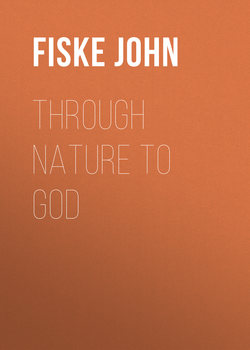Through Nature to God

Реклама. ООО «ЛитРес», ИНН: 7719571260.
Оглавление
Fiske John. Through Nature to God
PREFACE
THE MYSTERY OF EVIL
I. The Serpent's Promise to the Woman
II. The Pilgrim's Burden
III. Manichæism and Calvinism
IV. The Dramatic Unity of Nature
V. What Conscious Life is made of
VI. Without the Element of Antagonism there could be no Consciousness, and therefore no World
VII. A Word of Caution
VIII. The Hermit and the Angel
IX. Man's Rise from the Innocence of Brutehood
X. The Relativity of Evil
THE COSMIC ROOTS OF LOVE AND SELF-SACRIFICE
I. The Summer Field, and what it tells us
II. Seeming Wastefulness of the Cosmic Process
III. Caliban's Philosophy
IV. Can it be that the Cosmic Process has no Relation to Moral Ends?
V. First Stages in the Genesis of Man
VI. The Central Fact in the Genesis of Man
VII. The Chief Cause of Man's lengthened Infancy
VIII. Some of its Effects
IX. Origin of Moral Ideas and Sentiments
X. The Cosmic Process exists purely for the Sake of Moral Ends
XI. Maternity and the Evolution of Altruism
XII. The Omnipresent Ethical Trend
THE EVERLASTING REALITY OF RELIGION
I "Deo erexit Voltaire"
II. The Reign of Law, and the Greek Idea of God
III. Weakness of Materialism
IV. Religion's First Postulate: the Quasi-Human God
V. Religions Second Postulate: the undying Human Soul
VI. Religions Third Postulate: the Ethical Significance of the Unseen World
VII. Is the Substance of Religion a Phantom, or an Eternal Reality?
VIII. The Fundamental Aspect of Life
IX. How the Evolution of Senses expands the World
X. Nature's Eternal Lesson is the Everlasting Reality of Religion
Отрывок из книги
A single purpose runs throughout this little book, though different aspects of it are treated in the three several parts. The first part, "The Mystery of Evil," written soon after "The Idea of God," was designed to supply some considerations which for the sake of conciseness had been omitted from that book. Its close kinship with the second part, "The Cosmic Roots of Love and Self-Sacrifice," will be at once apparent to the reader.
That second part is, with a few slight changes, the Phi Beta Kappa oration delivered by me at Harvard University, in June, 1895. Its original title was "Ethics in the Cosmic Process," and its form of statement was partly determined by the fact that it was intended as a reply to Huxley's famous Romanes lecture delivered at the University of Oxford in 1893. Readers of "The Destiny of Man" will observe that I have here repeated a portion of the argument of that book. The detection of the part played by the lengthening of infancy in the genesis of the human race is my own especial contribution to the Doctrine of Evolution, so that I naturally feel somewhat uncertain as to how far that subject is generally understood, and how far a brief allusion to it will suffice. It therefore seemed best to recapitulate the argument while indicating its bearing upon the ethics of the Cosmic Process.
.....
I feel as if one could not be too grateful to Mr. Mill for having so neatly and sharply stated, in modern language and with modern illustrations, this old conclusion, which after all is substantially that of Plato and the Gnostics. For the shock which such a clear, bold statement gives to our religious feelings is no greater than the shock with which it strikes counter to our modern scientific philosophy. Suppose we could bring back to earth a Calvinist of the seventeenth century and question him. He might well say that the God which Mr. Mill offers us, shorn of the attribute of omnipotence, is no God at all. He would say with the Hebrew prophet, that God has created the evil along with the good, and that he has done so for a purpose which human reason, could it once comprehend all the conditions of the case, would most surely approve as infinitely wise and holy. Our Calvinist would ask who is responsible for the original constitution of things if not the Creator himself, and in supposing anything essentially vicious in that constitution, have not Plato and the Gnostics and the Manichæans and Mr. Mill simply taken counsel of their ignorance? Nay, more, the Calvinist would declare that if we really understood the universe of which humanity is a part, we should find scientific justification for that supreme and victorious faith which cries, "Though he slay me, yet will I trust in him!" The man who has acquired such faith as this is the true freeman of the universe, clad in stoutest coat of mail against disaster and sophistry, – the man whom nothing can enslave, and whose guerdon is the serene happiness that can never be taken away.
Now in these strong assertions it seems to me that the Calvinist is much more nearly in accord with our modern knowledge than are Plato and Mill. It is not wise to hazard statements as to what the future may bring forth, but I do not see how the dualism implied in all these attempts to refer good and evil to different creative sources can ever be seriously maintained again. The advance of modern science carries us irresistibly to what some German philosophers call monism, but I prefer to call it monotheism. In getting rid of the Devil and regarding the universe as the multiform manifestation of a single all-pervading Deity, we become for the first time pure and uncompromising monotheists, – believers in the ever-living, unchangeable, and all-wise Heavenly Father, in whom we may declare our trust without the faintest trace of mental reservation.
.....